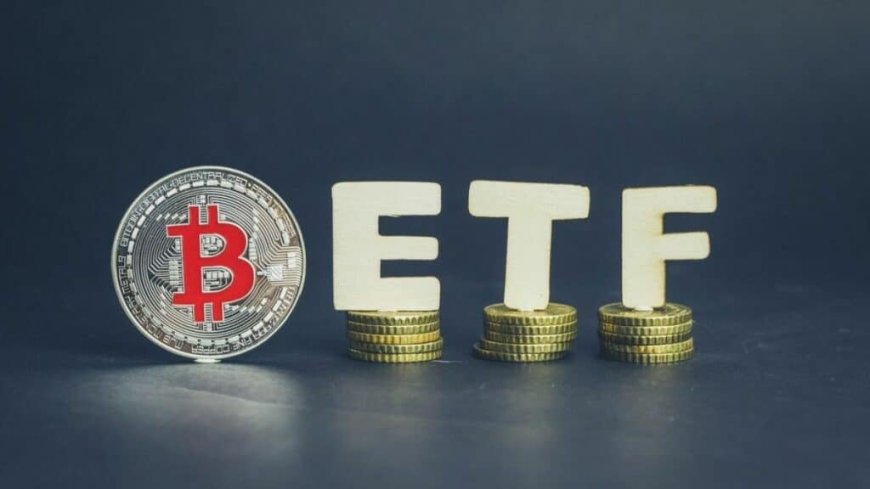Bitcoin ETF Countdown: Fees, Launch Dates, and Everything You Need to Know for This Potential Crypto
Invest in Bitcoin without buying crypto? Breakdown of potential ETF fees & why owning a slice could be golden.

Approval for thirteen spot Bitcoin (CRYPTO: BTC) ETFs awaits the Securities and Exchange Commission (SEC), signaling a potential shift in the crypto investment landscape.
Historically, the SEC has rejected similar ETF applications, but an appellate court deemed their rejection "arbitrary and capricious."
A green light for spot Bitcoin ETFs holds significant implications for investors across the board. Whether deeply involved in crypto or diversifying a retirement account, the SEC's decision could pave the way for broader participation in the evolving crypto asset class.
Significance of the new wave of Bitcoin ETFs
Current Bitcoin funds, like the Grayscale Bitcoin Trust, utilize derivatives such as futures contracts to mirror Bitcoin's price. However, these funds cannot redeem Bitcoin futures for the actual asset, leading to potential discrepancies in prices. Notably, Grayscale Bitcoin Trust experienced almost a 50% discount to its net asset value in late 2022.
Understanding the fees for owning a Bitcoin ETF
Several fund companies have outlined their fees for their respective Bitcoin ETFs. Invesco Galaxy plans to waive fees for the first six months on the initial $5 billion in invested assets. While this is a common strategy for new funds entering a competitive market, long-term investors might find it impractical due to potential tax implications when transitioning to a lower-cost fund post the free period.
It's crucial to note that many proposed ETFs have yet to disclose their fees, with notable absenteeism from Blackrock. Given its size, investors can anticipate Blackrock offering a relatively low fee.
Importantly, published fees are considerably below the expense ratios of existing Bitcoin investment products. For comparison, Grayscale charges a 2% management fee, while the ProShares Bitcoin Strategy ETF charges 0.95%. Hence, investors not only gain a fund that tracks Bitcoin more accurately but also at a lower cost.
Additional reasons to consider Bitcoin ETF fees
A spot Bitcoin ETF provides a straightforward and secure avenue for many investors to enter the cryptocurrency market. While buying Bitcoin directly on a crypto exchange is feasible, setting up a retirement account with one is more complex and expensive.
| Fund | Expense Ratio |
|
Fidelity Wise Origin |
0.39% |
|
Invesco Galaxy |
0.59% |
|
Valkyrie |
0.8% |
|
ARK 21Shares |
0.8% |
Furthermore, holding Bitcoin investments in the same account as other assets enhances portfolio visibility. This eliminates the need to consolidate information across multiple accounts for a comprehensive overview.
For many investors, overcoming the technical challenges of purchasing and securely holding Bitcoin is daunting. An ETF, managed by an institution, streamlines this process, with the managing entity implementing robust security measures and cold storage to safeguard investors' Bitcoin holdings.
Frequently Asked Questions and Answers About Bitcoin ETF
1. What happens if Bitcoin ETFs launch this week?
-
Increased Market Access: Easier entry for institutional and retail investors could boost demand and potentially inflate Bitcoin prices.
-
Volatility Fluctuations: The influx of new investments might initially increase volatility, creating short-term price swings.
-
Regulatory Scrutiny: Expect continued scrutiny from the SEC and other financial agencies, potentially impacting launch dates and product offerings.
2. Will Bitcoin ETFs make Bitcoin more stable?
-
Potentially, in the long run: Increased institutional participation could lend stability to the market by introducing more sophisticated trading strategies and hedging tools.
-
Short-term volatility remains likely: Any major shifts in investment activity from ETFs could still cause price fluctuations.
3. How much could I earn from a Bitcoin ETF?
-
Similar to Bitcoin's performance: Your earnings depend on the underlying price of Bitcoin, which historically has been highly volatile.
-
Consider fees: Factor in expense ratios and management fees associated with specific ETFs, impacting your net returns.
4. Are Bitcoin ETFs safe for beginner investors?
-
High risk involved: Bitcoin itself is a volatile asset with inherent risks. ETFs might offer easier access, but the risk profile remains high.
-
Do your research: Understand the mechanics of ETFs, the underlying risks of Bitcoin, and your own risk tolerance before investing.
5. Spot Bitcoin ETFs vs. Futures-Based ETFs:
-
Spot ETFs: Track the current price of Bitcoin, potentially offering more direct exposure and higher volatility.
-
Futures-Based ETFs: Track Bitcoin futures contracts, offering slightly less volatility but potentially deviating from the actual Bitcoin price.
6. Which Bitcoin ETF should I invest in?
-
Research carefully: Compare expense ratios, underlying assets, investment objectives, and management teams before making a decision.
-
Seek professional advice: Consider consulting a financial advisor for personalized recommendations based on your risk tolerance and goals.
7. Bitcoin ETF Launch Date Predictions:
-
Uncertain, but imminent: With SEC approval granted for one proposal, other applications are still pending.Launches could occur anytime between January 10th and March.
8. Potential Tax Implications of Bitcoin ETFs:
-
Capital gains tax: Applies to profits accrued from selling your ETF shares, depending on the holding period.
-
Consult a tax professional: Seek guidance on specific tax implications in your jurisdiction.
9. Countries Likely to Approve Bitcoin ETFs First:
-
North America: The US and Canada have seen significant progress with SEC approvals and ETF applications.
-
Developed economies with established crypto markets: Other countries like Germany and Singapore might follow suit soon.
10. Impact of Bitcoin ETFs on Traditional Markets:
-
Increased correlation: Bitcoin prices could influence traditional market movements and vice versa, creating new investment opportunities and risks.
-
Institutional engagement: Broader ETF access could attract more institutional investors into the cryptocurrency space, potentially influencing market dynamics.
Remember, these are just potential scenarios and uncertainties remain. Conduct thorough research, prioritize risk management, and consult with professionals before making any investment decisions.
In conclusion, the fees associated with the new spot Bitcoin ETFs are highly reasonable, even when compared to conventional index funds. For instance, the Invesco QQQ Trust, tracking the Nasdaq 100 index, has an expense ratio of 0.2%. Therefore, paying as little as 0.39% for a Bitcoin ETF represents a modest cost for potential investors.
Also Read: Countdown to SEC Decision: What Investors Should Know About Spot Bitcoin ETFs





























































